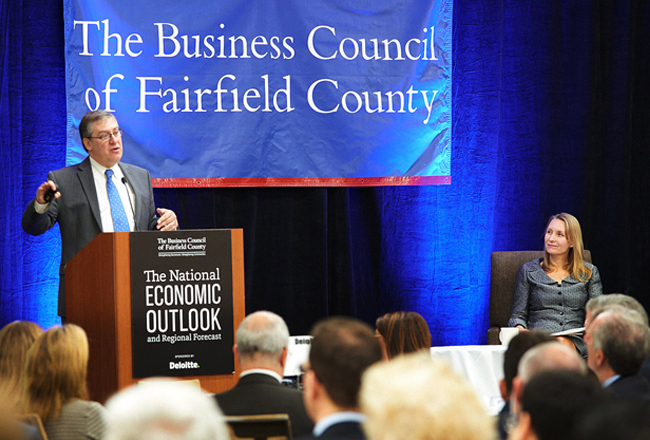The last time major tax reform was passed ”“ President Ronald Reagan”™s Tax Reform Act of 1986 ”“ it brought so many changes to the tax code the accounting industry nicknamed it the “Accountants Full Employment Act of 1986.”
Will the latest GOP-led tax reform, The Tax Cuts and Jobs Act of 2017, be a similar boon to the profession? It may be too early to say. Accountants in Westchester and Fairfield counties contacted by the Business Journal said the biggest impact so far has been a tax season in which phones are ringing constantly.
“The only other time I remember being this busy this early was the 1986 reform act, which was as big a sea change as this is in many ways,” said Ronald Hegt, a tax partner at Citrin Cooperman.
 In a normal season, Hegt said Citrin Cooperman”™s corporate business would pick up in January for regular tax filing season, while the individual would start in February. But now, as people hear about taxes almost daily on the news, Hegt said those timelines have sped up. He”™s fielded dozens of client calls about income tax, what”™s deductible and whether his clients should rethink the structure of their businesses.
In a normal season, Hegt said Citrin Cooperman”™s corporate business would pick up in January for regular tax filing season, while the individual would start in February. But now, as people hear about taxes almost daily on the news, Hegt said those timelines have sped up. He”™s fielded dozens of client calls about income tax, what”™s deductible and whether his clients should rethink the structure of their businesses.
Related: Hegt’s analysis, A new look at the new tax law
“Not a day goes by ”” and, mind you, this is not a complaint ”” when there is not significant work to do compared to what we usually have this time of year,” Hegt said.
The tax reform”™s passage in December means clients are asking questions about its impact as accounting firms are already finalizing tax filings for 2017 ”” which are mostly unaffected by the law”™s changes.
“You get to the end of February, beginning of March, and this is busy season for tax practices,” said Anthony J. Justic, a partner at Maier Markey & Justic LLP in White Plains. “You have that regular work that you always have and then on top of that you have the questions coming in, ”˜Hey, what should I do for 2018 now that tax reform is passed?”™”
Steve Gagnon, a partner at Reynolds & Rowella LLP in New Canaan, described a “major tsunami” from corporate clients.
“Corporate is a little more on top of things than individuals are ”” no offense meant,” Gagnon said. “On both sides there”™s been a fair amount of ”˜What does this mean for me for 2017?”™ But going forward, 2018 will be where they really see a difference.”
While Gagnon said “it”™s not Black Friday” with people rushing through the office”™s doors, his firm has heard from clients seeking clarifications on the law.
“A lot of the questions we get start with, ”˜I just read that”¦”™ or ”˜My buddy said that”¦”™ and what follows is usually not correct,” Gagnon said.
Bruce Blasnik, a partner at PKF O”™Connor Davies and managing partner of its Connecticut practice, said the tax bill”™s signing on Dec. 22 meant a lot of people ”” customers and PKF staff alike ”” were away on vacation. But even upon their collective return, he said, “Our call volume was high, but not really as high as we”™d anticipated it would be.”
Most questions came from those running flow-through companies ”” S corporations or partnerships ”” where the business”™ income is allocated among the owners and then included on their individual returns.
He said he expects PKF O”™Connor Davies to have a fair amount of work this year advising those who run an S corporation on whether they should consider becoming a C corporation, or vice-versa.
Blasnik said he expects clarification and guidance to be issued by the IRS over the next few months to help interpret some of the law”™s language, which he said seemed to have been “put together pretty hastily.”
“Most people are expecting to pay less taxes in 2018, except for those with really high incomes,” he said. “People with 5, 8, 10 million in income can probably expect to pay quite a bit more tax.”
Wait for clarifications was the message from Justic as well. Many terms and rules will need to be better defined, so Justic said his firm is telling clients, “Let”™s stay in touch, let”™s identify what the key areas are where we want clarification, and, when that clarification comes, what is our plan?”
President Donald Trump said early in 2017 that the tax bill would simplify the code enough to put tax prep company H&R Block out of business. The final legislation didn”™t end up so simple, but it could negatively impact parts of the accounting profession.
“For the easier type of tax returns that the storefront preparers do, I could see this cutting into business over next year to 18 months. There”™s going to be a whole lot more of the world being eligible for the standard deduction,” Hegt said. “But for the portion of the world that we are in, which is the sophisticated business person or wealthy individual investor types, I see it being a positive because it”™s probably more work, not less.”
Still, accounting firms contacted by the Business Journal didn”™t necessarily expect that extra business to require a hiring spree.
“It”™s an opportunity to be in touch with clients and be proactive, so I think that will enhance relationships,” Justic said. “But I don”™t think it will greatly grow our tax practice or anything. It”™s just an opportunity for us to demonstrate why clients are using us already.”






















